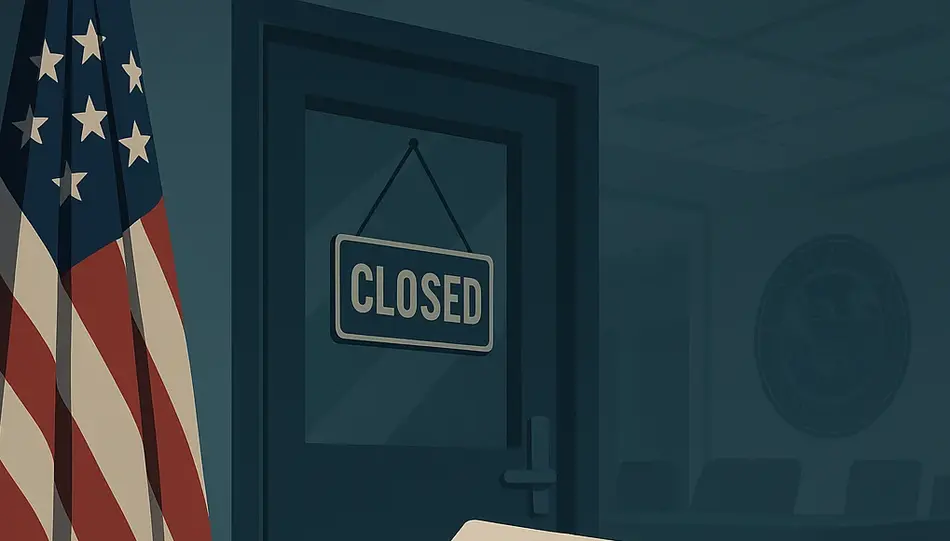ICE detention oversight agency has been temporarily closed during the government shutdown, creating a critical gap in monitoring and inspection of detention facilities that house over 60,000 migrants. This closure raises serious questions about the humane treatment of detainees and the safety of detention centers that have faced ongoing criticism for poor living conditions.
The closure of the Office of Detention Oversight comes at a time when Immigration and Customs Enforcement (ICE) is conducting record numbers of arrests, leading to overcrowded facilities and deteriorating conditions. Without proper oversight, concerns about access to medical care, legal counsel, and basic human needs are mounting.
What Makes ICE Detention Oversight Different from Other Government Functions
This distinguishes itself from typical government functions through its critical role in ensuring humane treatment of vulnerable populations. Unlike other agencies that can suspend non-essential operations during shutdowns, detention oversight involves the safety and well-being of people in custody who cannot advocate for themselves.
The Office of Detention Oversight is congressionally mandated to inspect every detention center in the country at least once a year, making it a crucial safeguard against abuse and neglect. This year alone, under the Trump administration, the office has conducted at least 80 different inspections of detention facilities.
The closure of this oversight function creates a dangerous situation where detention centers operate without independent monitoring, potentially leading to violations of human rights and basic standards of care.
The Impact of Government Shutdown on Detention Operations
The government shutdown has created a complex situation where ICE continues to make arrests and operate detention centers while the oversight agency responsible for monitoring these facilities is closed. This creates a fundamental imbalance between enforcement and accountability.
The Department of Homeland Security has significant discretion over which staff are considered essential during shutdowns, with only 8% of DHS staff being furloughed. This discretion has been used to maintain enforcement operations while suspending oversight functions, creating a dangerous precedent.
The shutdown has also highlighted the broader issue of how essential services are defined during government closures, with enforcement activities being prioritized over oversight and accountability measures.
Record Numbers and Overcrowding Concerns
The closure of ICE detention oversight comes at a time when detention centers are housing a record number of detainees due to increased enforcement activities. With over 60,000 people being held in these facilities, existing problems with overcrowding and poor conditions are being magnified.
Detainees are reporting that they are not allowed to sleep on beds and must sleep on floors, lack access to legal counsel, and cannot obtain quality food or outdoor recreation. These conditions violate basic standards of humane treatment and raise serious concerns about the health and safety of detainees.
The lack of oversight during this critical period means that these deteriorating conditions may go unnoticed and unaddressed, potentially leading to serious health and safety violations.
The Role of Congressional Mandates and Legal Requirements
ICE detention oversight is not just a bureaucratic function but a congressionally mandated responsibility designed to ensure that detention centers meet basic standards of care. The closure of this oversight function represents a failure to fulfill these legal obligations.
The congressional mandate requires annual inspections of every detention center in the country, making it clear that oversight is not optional but a legal requirement. The suspension of this function during the shutdown creates a gap in legal compliance that could have serious consequences.
The closure also raises questions about the administration’s commitment to fulfilling its legal obligations regarding the treatment of detainees, particularly when enforcement activities continue while oversight is suspended.
Medical Care and Health Concerns
One of the most critical aspects of ICE detention oversight is ensuring access to quality medical care for detainees. Without proper oversight, concerns about inadequate medical treatment and health emergencies are mounting.
Detainees in overcrowded facilities are particularly vulnerable to health problems, including the spread of infectious diseases and inadequate treatment of chronic conditions. The lack of oversight during this period means that these health concerns may go unaddressed.
The closure of oversight functions creates a situation where medical emergencies and health violations may not be properly documented or addressed, potentially leading to serious health consequences for detainees.
Legal Access and Due Process Concerns
ICE detention oversight also plays a crucial role in ensuring that detainees have access to legal counsel and can exercise their due process rights. Without proper oversight, concerns about access to legal representation are mounting.
Detainees who cannot access legal counsel are unable to effectively challenge their detention or present their cases for asylum or other forms of relief. This creates a fundamental violation of due process rights that oversight is designed to prevent.
The closure of oversight functions during a period of increased enforcement creates a situation where due process rights may be systematically violated without proper monitoring or accountability.
The Broader Implications for Immigration Policy
The closure of ICE detention oversight during the shutdown highlights broader concerns about the administration’s approach to immigration policy and the treatment of vulnerable populations. The prioritization of enforcement over oversight suggests a fundamental imbalance in policy priorities.
The shutdown has revealed the extent to which immigration enforcement has become a political tool rather than a balanced approach to managing immigration. The closure of oversight functions while maintaining enforcement operations demonstrates this imbalance.
The situation also highlights the need for comprehensive immigration reform that addresses both enforcement and humanitarian concerns, rather than the current approach that prioritizes enforcement at the expense of basic human rights.
Shaping the Future of Immigration Policy
The shutdown’s impact on immigration oversight underscores the urgent need for balanced, humane policies. Employers can support change by hiring legal, policy, and advocacy professionals who bring expertise and empathy to complex challenges. Post your job on WhatJobs today and connect with candidates ready to drive reform and protect vulnerable populations.
Post a Job Free for 30 Days →The Need for Immediate Action
The closure of ICE detention oversight requires immediate action to address the humanitarian crisis unfolding in detention centers. The lack of oversight during a period of record detentions creates an unacceptable situation that violates basic standards of humane treatment.
Congress and the administration must work together to ensure that oversight functions are restored and that detention centers are properly monitored. The current situation represents a failure of government to fulfill its basic obligations to protect vulnerable populations.
The closure also highlights the need for better planning and preparation for government shutdowns to ensure that essential oversight functions are not suspended during periods of political gridlock.
Frequently Asked Questions
What is ICE detention oversight and why is it important for migrant safety?
ICE detention oversight is a congressionally mandated system that inspects detention centers to ensure humane treatment of migrants, conducting regular inspections of facilities that house over 60,000 detainees and monitoring access to medical care, legal counsel, and basic human needs.
How does the ICE detention oversight closure differ from other government shutdown impacts?
ICE detention oversight closure differs from typical shutdown impacts by affecting vulnerable populations who cannot advocate for themselves, suspending congressionally mandated inspections while enforcement continues, and creating a dangerous imbalance between enforcement and accountability.
What are the main concerns about ICE detention oversight being closed during the shutdown?
Main concerns include lack of monitoring for overcrowded facilities with record 60,000 detainees, potential violations of human rights and basic care standards, inadequate medical care access, limited legal counsel availability, and systematic violations of due process rights without proper oversight.
How can the ICE detention oversight crisis be resolved and prevented in the future?
The crisis can be resolved by restoring oversight functions immediately, ensuring detention centers meet basic standards, providing adequate medical care and legal access, and implementing better shutdown planning to maintain essential oversight functions during government closures.
A Real-World Example: Maria’s Detention Experience
Maria Santos, a 32-year-old asylum seeker from Honduras, exemplifies how the ICE detention oversight closure can impact vulnerable migrants. After fleeing violence in her home country, Maria found herself detained in an overcrowded facility where conditions were rapidly deteriorating due to the lack of oversight.
“I had been in detention for three months when the oversight agency closed,” Maria explains. “Before that, we had regular inspections and could report problems with medical care and living conditions. When the oversight stopped, things got much worse very quickly.”
Maria’s journey through the detention system began when she was arrested at the border while seeking asylum. She was particularly concerned about the lack of access to medical care and legal counsel, which became even more difficult to obtain after the oversight agency closed.
“The conditions became unbearable,” Maria says. “We were sleeping on floors, couldn’t get proper medical care, and had no way to report problems. The ICE detention oversight closure meant that no one was checking on our safety or well-being.”
Within weeks of the oversight closure, Maria’s health began to deteriorate due to inadequate medical care and poor living conditions. She also struggled to access legal counsel to prepare her asylum case, making it difficult to present her case effectively.
“ICE detention oversight closure showed me how vulnerable we are when there’s no one watching,” Maria reflects. “The oversight agency was our only protection against abuse and neglect. Without it, we were completely at the mercy of the system, and many of us suffered as a result.”




